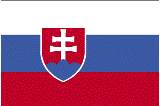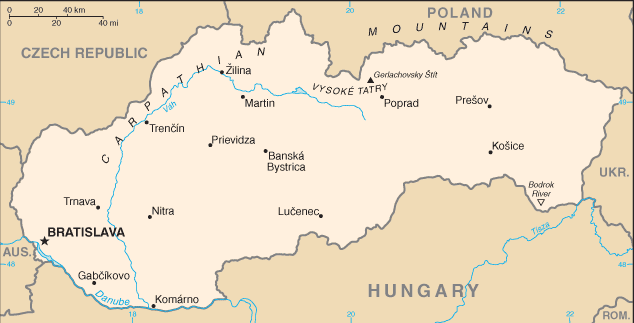|
Slovakia
|

|
Capital: Bratislava
Population: 5,457,013
Brief History of Slovakia:
The area known today as Slovakia has been inhabited by various peoples for thousands of years. Current day Slovakia can be traced to the Great Moravian Empire which was formed in the early 9th century. When Great Moravia was at its peak it included Slovakia, parts of Poland and Hungary, and the Czech Republic. After the Moravian Empire collapsed, Slovakia became part of the Hungarian Kingdom for over 1,000 years.
After World War I and the end of the Austro-Hungarian Kingdom, Slovakia became a part of the independent country Czechoslovakia. The first president was Tomas Masaryk in 1918.
After World War II, Czechoslovakia became a puppet communist state of the Soviet Union. When the Soviet Union collapsed in 1989, href='/geography/country.php?country=Czech%20Republic'>Czechoslovakia was free. The Slovaks and Czechs peacefully decided to separate and Slovakia became a fully independent nation in 1993. Slovakia joined the European Union in 2004.
The Geography of Slovakia
Total Size: 48,845 square km
Size Comparison: about twice the size of New Hampshire
Geographical Coordinates: 48 40 N, 19 30 E
World Region or Continent: Europe
General Terrain: rugged mountains in the central and northern part and lowlands in the south
Geographical Low Point: Bodrok River 94 m
Geographical High Point: Gerlachovsky Stit 2,655 m
Climate: temperate; cool summers; cold, cloudy, humid winters
Major cities: BRATISLAVA (capital) 428,000 (2009)
The People of Slovakia
Type of Government: parliamentary democracy
Languages Spoken: Slovak (official) 83.9%, Hungarian 10.7%, Roma 1.8%, Ukrainian 1%, other or unspecified 2.6% (2001 census)
Independence: 1 January 1993 (Czechoslovakia split into the Czech Republic and Slovakia)
National Holiday: Constitution Day, 1 September (1992)
Nationality: Slovak(s)
Religions: Roman Catholic 68.9%, Protestant 10.8%, Greek Catholic 4.1%, other or unspecified 3.2%, none 13% (2001 census)
National Symbol: double-barred cross (Cross of Lorraine) surmounting three peaks
National Anthem or Song: Nad Tatrou sa blyska (Storm Over the Tatras)
Economy of Slovakia
Major Industries: metal and metal products; food and beverages; electricity, gas, coke, oil, nuclear fuel; chemicals and manmade fibers; machinery; paper and printing; earthenware and ceramics; transport vehicles; textiles; electrical and optical apparatus; rubber products
Agricultural Products: grains, potatoes, sugar beets, hops, fruit; pigs, cattle, poultry; forest products
Natural Resources: brown coal and lignite; small amounts of iron ore, copper and manganese ore; salt; arable land
Major Exports: vehicles 25.9%, machinery and electrical equipment 21.3%, base metals 14.6%, chemicals and minerals 10.1%, plastics 5.4% (2004)
Major Imports: machinery and transport equipment 41.1%, intermediate manufactured goods 19.3%, fuels 12.3%, chemicals 9.8%, miscellaneous manufactured goods 10.2% (2003)
Currency: Slovak koruna (SKK)
National GDP: $126,900,000,000
** Source for population (2012 est.) and GDP (2011 est.) is CIA World Factbook.
Back to Geography Home Page
